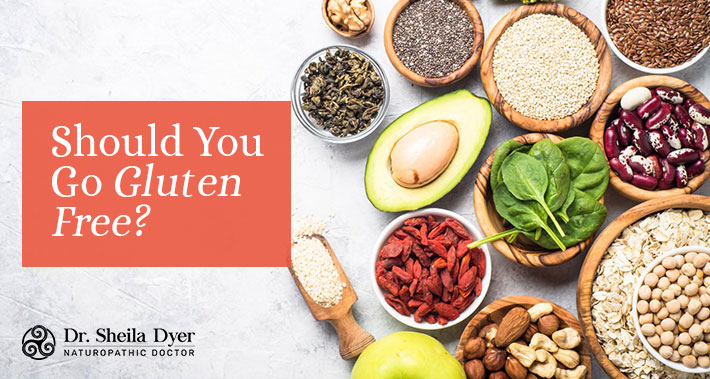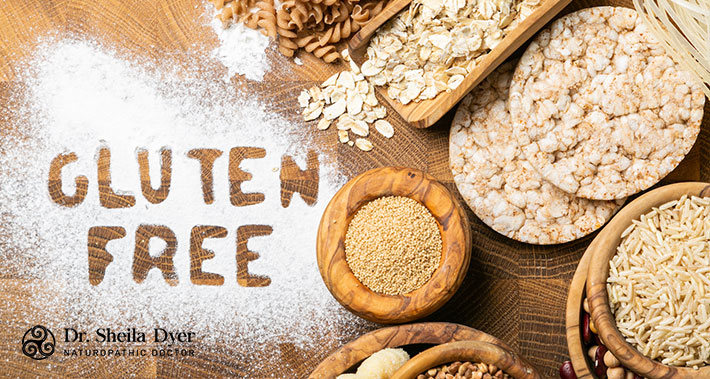Gluten-free diets: are they fad or friend?
I get a LOT of questions about going gluten-free, so much so that I was inspired to post some information on it to help answer your basic questions.
To introduce myself, I’m Dr. Sheila Dyer, and I’m a naturopathic doctor in Toronto.
I’m available to answer any questions you might have, and to prepare a treatment and nutritional plan for you if you suffer from gluten intolerance.
Read on for more information.
What Is Gluten, Anyway?
Gluten is a common name for prolamins, which are ‘storage proteins’ found in cereal grains.
Each grain has its own name for the prolamins it produces, but they are all generally referred to as gluten.
Gluten is a commonly used ingredient in foods, dueto its smooth texture, ability to retain moisture, and how useful it is as a binding agent.
This is part of the reason for hidden gluten – because it’s not only used by chefs to improve their culinary experience, but also by processed food manufacturers in most of the foods they produce.
Foods That Commonly Contain Gluten
There are too many to list every single one of them in this article, but they can be broken down into three main groups.
Grains are the food group that most people associate with gluten, making it easy to avoid.
Examples include whole wheat, wheat bran, wheat germ couscous, farro, bulgar, matzo, spelt, rye, and barley.
Interestingly though, there are some grains that don’t include gluten – these include arrowroot, sorghum, buckwheat, flax, millet, quinoa, rice, and cornmeal, among others.
Next up: many processed foods contain gluten, and there are some obvious grain-based products that you can look out for, including crackers, pasta, some soba noodles and veggie burgers, pastries and cookies, and even the vegan meat alternative seitan (soy, however, is gluten free).
Lastly, it’s not just solid food that can contain gluten – some drinks do, too.
Beer and some wines contain gluten, as do flavoured teas, instant coffees (and other instant drinks), plus the coffee whitener you put in them.
Foods That Might Contain Hidden Gluten
As mentioned above, because gluten is helpful to thicken and stabilize food, it is often hidden in processed foods.
For instance, we don’t necessarily thinkof gluten when we pop a piece of candy in our mouths, but these also contain gluten.
A lot of condiments, sauces, and even tomato sauce will contain gluten, so be sure to check the labels carefully.
Medical Conditions Directly Linked With Gluten
It’s possible that one of these is your reason for reading this article or reaching out to me.
If you’re aware you have one of these conditions, and want assistance in managing the impacts by learning more about gluten intolerance, I’m here to help.
1. Celiac Disease
Celiac disease is an autoimmune condition, and is well-known to be a severe reaction to the presence of gluten.
With celiac disease, your immune system attacks the cells of your small intestine when gluten is present.
The cause of celiac disease is unknown, but it seems to be at least partly genetic.
There is no cure for celiac disease, and so long as one maintains a strict gluten-free diet it’s not difficult to manage.
2. Non-Celiac Gluten Sensitivity
When you have the symptoms of people with celiac disease, but don’t actually HAVE celiac disease, then the medical community refers to it as ‘non-celiac gluten sensitivity’.
Once again, scientists don’t really know what is responsible for this condition – also known as NCGS – but once again, the best remedy is to go with a completely gluten-free diet.
3. Allergy To Wheat
Now, although most people who are gluten intolerant are ‘allergic’ to wheat, not all people allergic to wheat have a gluten intolerance.
Basically, the wheat allergy is an intolerance to the wheat itself, not the gluten in the wheat.
This means that people with an allergy to wheat will be able to eat other gluten-based foods, as long as they don’t contain wheat.
However, because wheat is such a common ingredient, they find themselves basically eating a gluten-free diet, because there is so much cross-over.
Symptoms Of Gluten Allergy/Sensitivity
Broadly speaking, it’s incredibly difficult to have Celiac disease, which is a gluten allergy, and not be aware of it.
Because the reaction is so painful and severe, it tends to be clear from a very young age.
However, non Celiac gluten sensitivity and wheat allergy tend to be less dramatic.
Some common symptoms of gluten sensitivity include:
- Digestive issues like diarrhea, constipation, bloating, and abdominal pain
- Chronic fatigue
- Anxiety and/or depression
- Eczema and other skin conditions
- Weight loss
- Headaches
- Anemia
- Osteoporosis
Medical Conditions Potentially Worsened By Gluten
If you find yourself relating to any of the above symptoms, try to keep an eye on whether they get worse when you eat gluten.
If they do, it’s possible you have a gluten sensitivity and don’t know it.
But even if you don’t, there are some conditions that can be aggravated by the presence of gluten.
If you suffer from any of these conditions, you could be making things worse for yourself by eating gluten.
1. Digestive Disorders
Gluten has been linked with various bowel diseases, such as IBS and IBD (inflammatory bowel syndrome and inflammatory bowel disease).
It can increase intestinal permeability for these people, and aggravate problems.
Other diseases to be aware of include Crohn’s disease and ulcerative colitis.
As well, gluten has also been shown to alter gut bacteria, which can have many side effects of its own.
2. Autoimmune Diseases
Gluten is known to worsen – or potentially even cause – autoimmune conditions such as Graves’ disease, rheumatoid arthritis, type 1 diabetes, and Hashimoto’s thyroiditis.
Research sheds a light on the common genes and immune pathways that these autoimmune diseases and celiac disease share.
Because people with these diseases are up to four times more likely to be diagnosed with celiac disease, medical professionals suggest maintaining a gluten-free diet.
3. Other Disorders
There are other disorders that benefit by a gluten-free diet; for instance, if you have endometriosis, fibromyalgia or atopy, or if you are obese.
Certain mental health conditions also benefit, such as schizophrenia.
Lastly – though not a condition – elite athletes stand to benefit from going gluten-free.
What If I Don’t Have One Of Those?
Even if you don’t suffer from any of the conditions or diseases listed above, you may find you benefit from adopting a gluten-free diet.
If you’re doing it for your own health and wellness reasons, you may still want to have an online naturopathic doctor in Toronto consultation, but you can likely make your own decision about whether to proceed or not.
In fact, you may have a slight gluten intolerance that you’re not even aware of, but will discover if you adjust your diet to exclude it for a while.
Why Do I Feel Better If I Avoid Gluten?
A number of people claim to feel significantly better when they avoid gluten, even if they don’t have any of the above conditions.
Why? There are a few reasons.
Firstly, when you cut gluten, you’re also cutting a lot of junk food, fast food, refined carbohydrates and sugar out of your diet.
That alone is enough to make you feel like a new person.
As people reduce these foods, they start to eat more whole foods and vegetables in order to keep themselves fueled – and these nutrient-laden foods get your body working optimally.
Finally, a lot of the foods listed above also cause an inflammatory response in your body, which can have all kinds of effects on your overall health.
Book An Appointment With Dr. Sheila Dyer, ND
I know that’s a lot of information, but it should give you a good overview of what I look at when someone comes to me with a suspected gluten intolerance or expresses a wish to adopt a gluten-free diet.
My best recommendation is that you call now and book an appointment, and we can go through your personal situation together.
I’ll be happy to help recommend some treatments to set your stomach more at ease.
If you have questions about naturopathic medicine, or would like to start with your first consultation, contact me, and let’s book an appointment.
Dr. Sheila Dyer, ND1080 Dovercourt Rd,
Toronto, ON M6H 2X8
(416) 554-5135
► https://g.page/DrSheilaDyerNd
Dr. Sheila Dyer is a Naturopathic Doctor and a practicing registered nurse offering holistic healthcare with a scientific focus

